>What is Irritable Bowel Syndrome (IBS)?
Irritable Bowel Syndrome (IBS) is a group of symptoms affecting the digestive system. It implies the absence of structural abnormalities in the digestive system. But, certain trigger factors cause an adverse functional effect in some individuals, resulting in gastrointestinal disorders lasting elongated periods of days or months. 1
There are four types of IBS – 2
1. IBS-C (IBS with Constipation)
2. IBS-D (IBS with Diarrhoea)
3. IBS-M (Mixed type IBS alternating between Constipation and Diarrhoea). Also known as IBS-A (Alternating IBS) characterized by predominance of pain.
4. IBS-U (Unspecified or unidentified IBS; not fitting any of the above categories)
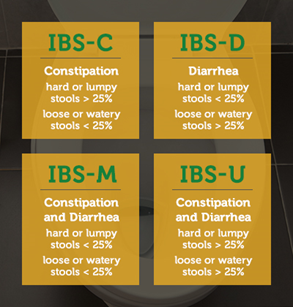
A new type of IBS has been discovered known as IBS-PI. This is post-infectious IBS developing after an infection such as jaundice, vomiting, positive stool culture, etc. 4
Trigger Factors
The exact cause of IBS is not yet known. However, certain trigger factors have been observed and are known to cause digestive disorders.
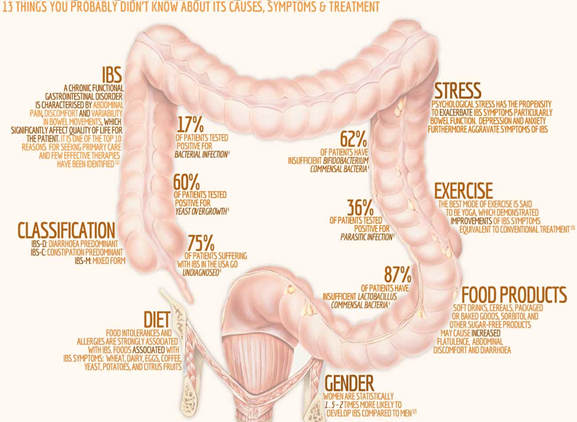
1. Foods – The link between conditions such as food allergies and gluten intolerance with IBS is not yet known. However, certain foods such as chocolate, spices, acidic foods, milk, alcoholic beverages, cabbage, cauliflower, etc. have been implicated to trigger IBS in certain individuals. 6
2. Stress – Periods of increasing stress aggravate IBS but stress does not directly cause IBS. 6
3. Low pain threshold during the process of digestion (gut dilation) as well as disruption of gut microflora due to rampant and unnecessary consumption of antibiotics. 7, 8
4. Carbohydrate malabsorption resulting in digestive disorders such as diarrhoea, bloating, and other gastrointestinal problems. 9
Symptoms
IBS is a collection of symptoms manifesting as digestive disorders such as – 10, 11, 12
• Abdominal pain
• Cramping
• Constipation
• Diarrhoea
• Flatulence
• Excessive bowel movements
• Diarrhoea followed by constipation or vice-versa
• Mucous or water mixed with stools
• Nausea
• Poor appetite
• Indigestion
• Unexplained weight loss
Management Therapies
IBS does not have a cure. However, treatment can be administered by effective management of the symptoms and understanding the trigger factors in a particular individual.
1. Diet â€" FODMAP stands for Fermentable Oligo-, Di-, Monosaccharides, And Polyols. As per evidence presented, restricted consumption of these from the diet may have a beneficial effect for individuals suffering from IBS. Short chain carbohydrates are not absorbed completely by the intestine hence drag water into the intestine via osmosis. Also, these molecules are readily fermented by intestinal microflora, generating gases. Studies have shown that up to 70% of IBS patients benefitted from consuming a low FODMAP diet. 13,14
Consumption of soluble fibre bulks faecal material for IBS-D patients and allows for easy passage of stools for IBS-C patients.
There is no 'one-size-fits-all' remedial diet for individuals suffering from IBS. However, fizzy drinks are not advisable for consumption as the acidic content may irritate the lining of the gastrointestinal tract. 1
2. Medication â€" Medications for treatment of IBS come under the following categories â€"
· Laxatives â€" They help ease constipation and enable having regular bowel movements. However, they do not provide relief from symptoms such as stomach aches and bloating. 15,16
Four types of Laxatives can be considered - 15
- Laxatives such as methylcellulose, polycarbophil, psyllium, etc. can be regarded as effective medications as these contain Soluble Fibre.
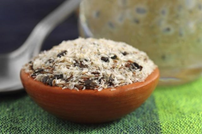
- Osmotic laxatives are those which soften the stool by pulling water back into the colon. 16 Some of these are milk of magnesia, magnesium citrate, sorbitol, polyethylene glycol, etc. It takes around 1 to 2 days for osmotic laxatives to start showing their effect.
- Stimulant laxatives function by triggering muscles around the intestine, enabling the stool to move through the colon. However, once relieved of constipation, it is advisable to consume these drugs with caution as they can cause dehydration and electrolyte disturbances. 18 Some of the stimulant laxatives available are bisacodyl, sennosides, etc.
- Emollients add moisture to the faecal material, resulting in softening of stool. Some of the emollients which can be used to treat IBS are docusate sodium, and dioctyl calcium sulfosuccinate.
· Anti-spasmodic / Anti-cholinergic drugs – These drugs result in an overall reduction of excessive motility of gastrointestinal tract (gut spasm). 19
There are two types of anti-spasmodic / anti-cholinergic drugs – 20
- Acetyl choline is a neurotransmitter, resulting in muscle contraction. For treatment of IBS, antimuscarinics function by attaching themselves to muscarine acetyl choline receptors, thereby blocking transfer of nerve impulse conduction. This results in decreased gastrointestinal muscular contraction. Some of the antimuscarinics recommended are dicycloverine, atropine, hyoscine, etc. 20
- Smooth muscle relaxants work directly on the smooth muscles of GI tract by enabling muscle relaxation and bringing about pain relief as a result of muscle contraction. Some of the smooth muscle relaxants are alverine, mebeverine, peppermint oil. 20
· Anti-diarrhoeal drugs – These drugs help in easing the frequency of bowel movements, increasing absorption of water from the intestines, and improving muscle tone of anal sphincter for its improved functioning. 21
Drugs such as diphenoxylate and loperamide reduce movements of the intestine. This allows greater time for water absorption (as stool is not eliminated out quickly), resulting in firmer stools. However, numerous side effects are seen with the consumption of these drugs. 22
Some over-the-counter medications such as simethocone (for gas relief) are regarded to be safe. 23
· Anti-depressants – Stress and depression are known to be trigger factors for IBS or aggravating the symptoms already present. Therefore, administration of anti-depressants for IBS treatment enables in correcting imbalance of brain neurotransmitters which might otherwise result in depression.
Anti-depressants themselves have a multi-pronged effect in addition to treatment of depression (which includes providing relief from IBS symptoms). Therefore, in the case of IBS, anti-depressants work by blocking pain signals from the brain to the gut. This helps the brain to respond to pain signals in a much more effective manner. Dosage recommended for IBS patients is much lower as compared to individuals suffering from depression. 24
A small study suggests that selective serotonin reuptake inhibitors (SSRIs) can help patients suffering from IBS in cases of serotonin deficiency. Low-dose tricyclic antidepressants such as amitriptyline and desipramine have been found to be effective against IBS-D. 19
Long term anti-depressant medication may be required for effective IBS management. 25
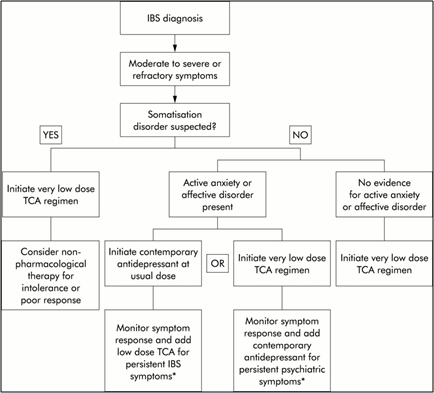
An algorithm for the initiation of antidepressants in irritable bowel syndrome (IBS)
*Combined treatment with a tricyclic antidepressant (TCA) and some contemporary antidepressants will reduce hepatic metabolism of the TCA wherein TCA levels must be monitored to avoid toxicity (Clouse and Lustman) 26
- Newer medications
Alosteron is an anti-depressant that blocks pain signals from the brain to the gut. Rifaximin is an antibiotic that alters gut bacteria and provides relief from IBS symptoms after a 10-14 day course treatment. Eluxadoline is a new drug that helps in reducing contractions of the bowel and abdominal pain as well as improving stool consistency. 27
- IBS-C –
Lubiprostone promotes peristalsis, improving bowel movements by promoting secretion through chloride channels. Linaclotide works by blocking pain signals in the intestine and improving movement of contents of the gastrointestinal tract. 27
The following drugs are currently under clinical trial for the treatment of IBS.
- Serotonin Synthesis Inhibitors
- Ramosetron
- Spherical carbon adsorbent
- Benzodiazepine receptor modulator
- Peripheral k-agonist 28
Prebiotics and Probiotics –
Prebiotics are specially formulated plant fibres which help in stimulating growth and activity of microorganisms in the gut. 29
Prebiotics such as Oligofructose-Enriched-Inulin (OEI), Galacto-oligosaccharides (GOS), trans-GOS, lactulose, Oligofructose, short-chain fructo-oligosaccharides (scFOS), and Inulin ensure nourishment of beneficial bacteria throughout the colon. Other sources of prebiotics include bananas, garlic, wheat, rye, and asparagus. 30, 31
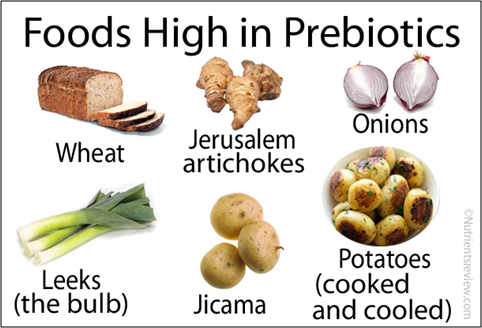
(Please note – Prebiotics comprise of short-chain carbohydrates which are also found in the FODMAP diet. Therefore, prebiotics should be consumed strictly under medical supervision. Care should be taken so as to consume a low FODMAP diet as well as non-fermentable sugars so as to prevent aggravation of IBS symptoms)33
Probiotics are food sources or supplements containing microorganisms which promote optimal and effective gastrointestinal functioning. The most commonly known source of probiotics is yogurt. However, IBS is characterized by a wide range of digestive malfunction symptoms which require broad-spectrum functioning of probiotics for effective treatment.
Characteristics of probiotics recommended for IBS – 34
- Non-toxic and non-pathogenic
- Proven beneficial effect on host
- Sufficiently large quantities of micro-organisms per unit
- Capable of surviving as well as carrying out intraluminal metabolic activity
- Remain viable during storage and use
Species such as Bifidobacterium infantis provide relief from IBS symptoms such as abdominal pain, bloating, as well as bowel movement irregularity. As per evidence based on scientific research, gut microflora in IBS patients is different as compared to non-IBS individuals. 35
Some of the best known probiotics for treatment of IBS –
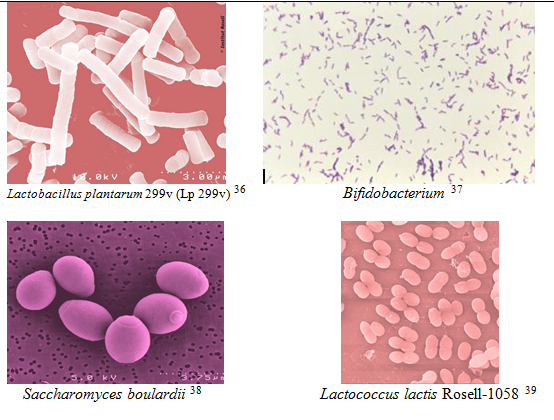
Action of probiotics on gastrointestinal tract – 34
- Physical barrier
- Nutrient competing
- Improvement in metabolism
- Production of bacteriocin against pathogens
- Intestinal mucosal barrier
- Selective permeability of intestinal cells
- Intervention in inflammatory response as part of immune system
Conclusion
Irritable Bowel Syndrome is an extremely debilitating illness which hampers the quality of daily life. However, effective therapies are available – such as, diet, drugs, prebiotics, and probiotics - so as to help the patient alleviate the effects of the symptoms of IBS, and live a normal life to the maximum possible extent.
References:
References (if any)
1. Irritable Bowel Syndrome, Symptoms, and treatment for IBS | Patient. Available from http://patient.info/health/irritable-bowel-syndrome-leaflet (Accessed on May 10, 2016)
2. Definition and Facts for Irritable Bowel Syndrome | National Institute of Diabetes and Digestive and Kidney Diseases (NIDDK). Available from http://www.niddk.nih.gov/health-information/health-topics/digestive-diseases/irritable-bowel-syndrome/Pages/definition-facts.aspx (Accessed on May 10, 2016)
3. Low FODMAP Diet for IBS: Is It The Best Answer? Available from https://www.prebiotin.com/low-fodmap-diet-for-ibs-work/ (Accessed on May 14, 2016)
4. Irritable bowel syndrome â€" Wikipedia, The Free Encyclopedia. Available from https://en.wikipedia.org/wiki/Irritable_bowel_syndrome#Classification (Accessed on May 10, 2016)
5. Irritable Bowel Syndrome Causes and Management â€" DivynenHealthy :: DivynenHealthy. Available from http://www.divynenhealthy.com/irritable-bowel-syndrome/ (Accessed on May 14, 2016)
6. Irritable bowel syndrome Causes â€" Mayo Clinic. Available from http://www.mayoclinic.org/diseases-conditions/irritable-bowel-syndrome/basics/causes/con-20024578 (Accessed on May 10, 2016)
7. Why Irritable Bowel Syndrome sufferers feel more pain â€" Saga. Available from http://www.saga.co.uk/magazine/health-wellbeing/conditions/ibs-sufferers-feel-more-pain (Accessed on May 10, 2016)
8. Gut Bacteria and IBS. Available from http://www.aboutibs.org/gut-bacteria-and-ibs.html (Accessed on May 10, 2016)
9. Goldstein, R., Braverman, D., Stankiewicz, H. Carbohydrate malabsorption and the effect of dietary restriction on symptoms of irritable bowel syndrome and functional bowel complaints. Israel Medical Association Journal. 2000 Aug;2(8):p.583-7. Available from http://www.ima.org.il/FilesUpload/IMAJ/0/63/31532.pdf (Retrieved on May 10, 2016)
10. Irritable bowel syndrome symptoms â€" Mayo Clinic. Available from http://www.mayoclinic.org/diseases-conditions/irritable-bowel-syndrome/basics/symptoms/con-20024578 (Accessed on May 10, 2016)
11. Irritable bowel syndrome (IBS) â€" Symptoms â€" NHS Choices. Available from http://www.nhs.uk/Conditions/Irritable-bowel-syndrome/Pages/Symptoms.aspx (Accessed on May 10, 2016)
12. Irritable Bowel Syndrome, Symptoms and treatment for IBS | Patient. Available from http://patient.info/health/irritable-bowel-syndrome-leaflet (Accessed on May 10, 2016)
13. FODMAP â€" Wikipedia, The Free Encyclopedia. Available from https://en.wikipedia.org/wiki/FODMAP (Accessed on May 11, 2016)
14. Maagaard L, Ankersen DV, Végh Z, Burisch J, Jensen L, Pedersen N, Munkholm P. Follow-up of patients with functional bowel symptoms treated with a low FODMAP diet. World J Gastroenterol 2016; 22(15): 4009-4019. Available from http://www.wjgnet.com/1007-9327/full/v22/i15/4009.htm (Retrieved on May 11, 2016)
15. Laxatives. Available from http://www.aboutibs.org/medications/laxatives.html (Accessed May 12, 2016)
16. IBS Laxative Safety: Types of Laxatives, Side Effects, and More. Available from http://www.webmd.com/ibs/irritable-bowel-syndrome-laxative-safety (Accessed on May 12, 2016)
17. How to Detox with Psyllium Husk | LIVESTRONG.COM. Available from http://www.livestrong.com/article/108162-detox-psyllium-husk/ (Accessed on May 14, 2016)
18. Owen, R.T. Lubiprostone - A Novel Treatment for Irritable Bowel Syndrome with Constipation. Drugs Today (Barc.) 2008 Sep;44(9):645-52. doi: 10.1358/dot.2008.44.9.1269852. Available from http://www.ncbi.nlm.nih.gov/pubmed/19137119. (Retrieved on May 12, 2016)
19. Irritable bowel syndrome (IBS) â€" Treatment â€" NHS Choices. Available from http://www.nhs.uk/Conditions/Irritable-bowel-syndrome/Pages/Treatment.aspx (Retrieved on May 12, 2016)
20. Antispasmodic Medicines. IBS medicine side effects, dosage. | Patient. Available from http://patient.info/health/antispasmodic-medicines (Accessed on May 12, 2016)
21. Antidiarrheal Agents. Available from http://www.aboutibs.org/medications/antidiarrheal-agents.html (Accessed on May 12, 2016)
22. Antidiarrheals for Irritable Bowel Syndrome- Topic Overview. Available from http://www.webmd.com/ibs/tc/antidiarrheals-for-irritable-bowel-syndrome-topic-overview (Accessed on May 12, 2016)
23. Treating IBS and Diarrhea: Diet, Medications, Supplements, and More. Available from http://www.webmd.com/ibs/treating-diarrhea?page=2 (Accessed on May 12, 2016)
24. Antidepressant Medications. Available from http://www.aboutibs.org/medications/antidepressant-medications.html (Accessed on May 12, 2016)
25. Clouse RE. Antidepressants for irritable bowel syndrome. Gut. 2003;52(4):598-599. Available from http://www.ncbi.nlm.nih.gov/pmc/articles/PMC1773590/ (Retrieved on May 12, 2016)
26. Clouse RE, Lustman PJ. Antidepressants for irritable bowel syndrome. In: Camilleri M, Spiller RC, eds.Irritable Bowel Syndrome: Diagnosis and Treatment. London: WB Saunders, 2002:161â€"71 (Retrieved on May 13, 2016)
27. Newer IBS Medications. Available from http://www.aboutibs.org/medications/newer-ibs-medications.html (Accessed on May 13, 2016)
28. Current and future treatments for IBS-D â€" For Medical Professionals â€" Mayo Clinic. Available from http://www.mayoclinic.org/medical-professionals/clinical-updates/digestive-diseases/better-agents-needed-irritable-bowel-syndrome-diarrhea (Accessed on May 13, 2016)
29. IBS Supplements: Fiber, Probiotics, Prebiotics, and More. Available from http://www.webmd.com/ibs/features/supplements-for-ibs-what-works (Accessed on May 14, 2016)
30. Slavin J. Fiber and Prebiotics: Mechanisms and Health Benefits. Nutrients. 2013;5(4):1417-1435. doi:10.3390/nu5041417. Available from http://www.ncbi.nlm.nih.gov/pmc/articles/PMC3705355/ (Accessed on May 14, 2016)
31. Magge S, Lembo A. Complementary and Alternative Medicine for IBS. In: Chey WD ed. Irritable Bowel Syndrome, An Issue of Gastroenterology Clinics of North America. Pennsylvania: WB Saunders, 2011;40(1):246 (Retrieved on May 14, 2016)
32. What is a prebiotic fiber? List, Food Examples, Benefits. Available from http://www.nutrientsreview.com/carbs/fiber-prebiotics.html (Accessed on May 14, 2016)
33. Prebiotics and Probiotics: The Answer To Your IBS? â€" Stephanie Clairmont. Available from http://www.stephanieclairmont.com/prebiotics-and-probiotics-the-answer-to-your-ibs/ (Accessed on May 14, 2016)
34. Dai C, Zheng C-Q, Jiang M, Ma X-Y, Jiang L-J. Probiotics and irritable bowel syndrome. World Journal of Gastroenterology : WJG. 2013;19(36):5973-5980. doi:10.3748/wjg.v19.i36.5973. Available from http://www.ncbi.nlm.nih.gov/pmc/articles/PMC3785618/ (Retrieved on May 14, 2016)
35. Distrutti E, Monaldi L, Ricci P, Fiorucci S. Gut microbiota role in irritable bowel syndrome: New therapeutic strategies. World Journal of Gastroenterology. 2016;22(7):2219-2241. doi:10.3748/wjg.v22.i7.2219. Available from http://www.ncbi.nlm.nih.gov/pmc/articles/PMC4734998/ (Retrieved on May 14, 2016)
36. Lactobacillus plantarum 299v, Natural Solutions to GI Problems. Available from http://www.jarrow.com/articles/release/id/417/Lactobacillus_Plantarum_299v,_Natural_Solutions_to_GI_Problems (Accessed on May 14, 2016)
37. Probiotics for irritable bowel syndrome: what does the medical evidence tell us? | Dr. Jen Gunter. Available from https://drjengunter.wordpress.com/2011/10/03/probiotics-for-irritable-bowel-syndrome-what-does-the-medical-evidence-tell-us/ (Accessed on May 14, 2016)
38. OptiBac Probiotics Saccharomyces boulardii. Available from http://www.optibacprobiotics.co.uk/shop/saccharomyces-boulardii (Accessed on May 14, 2016)
39. OptiBac Probiotics 'One week flat'. Available from http://www.optibacprobiotics.co.uk/shop/one-week-flat (Accessed on May 14, 2016)
About Author / Additional Info:
I am a post-graduate in Biochemistry from the University of Mumbai